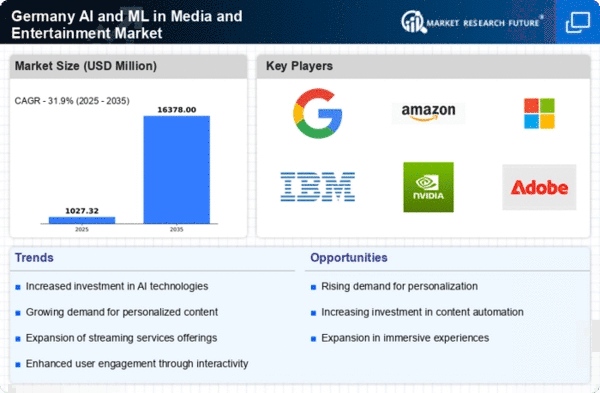Technological Advancements in AI
The rapid evolution of AI technologies is a primary driver for the ai ml-in-media-and-entertainment market. In Germany, advancements in machine learning algorithms and natural language processing are enabling more sophisticated content creation and curation. This technological progress is reflected in the increasing investment in AI startups, which reached approximately €1.5 billion in 2025. As companies adopt these technologies, they can enhance production efficiency and improve audience engagement. Furthermore, the integration of AI tools in post-production processes is streamlining workflows, allowing for quicker turnaround times and higher quality outputs. This trend suggests that as AI capabilities continue to expand, the media and entertainment sector in Germany will likely experience transformative changes, leading to innovative content delivery methods and enhanced viewer experiences.
Increased Investment in AI Solutions
Investment in AI solutions is a crucial driver for the ai ml-in-media-and-entertainment market in Germany. In recent years, funding for AI-related projects has surged, with estimates suggesting that investments could exceed €2 billion by the end of 2025. This influx of capital is enabling media companies to explore advanced AI applications, such as automated content generation and predictive analytics. As organizations recognize the potential of AI to enhance operational efficiency and audience engagement, they are increasingly allocating resources towards developing and implementing these technologies. This trend not only fosters innovation but also encourages collaboration between tech firms and media companies, further propelling the growth of AI in the entertainment landscape. The ongoing commitment to AI investment suggests a promising trajectory for the industry.
Growing Demand for Streaming Services
The surge in demand for streaming services is significantly impacting the ai ml-in-media-and-entertainment market. In Germany, the number of streaming subscribers has increased by over 30% in the past year, driven by consumer preferences for on-demand content. This shift is prompting media companies to leverage AI and machine learning to analyze viewer habits and preferences, enabling personalized content recommendations. As a result, platforms are investing heavily in AI-driven analytics tools to optimize their offerings and enhance user satisfaction. The competitive landscape is intensifying, with established players and new entrants alike seeking to differentiate themselves through innovative AI applications. This growing demand for tailored content experiences indicates a robust future for AI technologies within the media and entertainment sector in Germany.
Regulatory Support for AI Development
Regulatory frameworks in Germany are evolving to support the development and deployment of AI technologies in the ai ml-in-media-and-entertainment market. The government is actively promoting initiatives that encourage innovation while ensuring ethical standards are maintained. This supportive environment is likely to facilitate the integration of AI solutions across various media platforms. For instance, policies aimed at fostering research and development in AI are expected to enhance collaboration between academic institutions and industry players. As regulations adapt to the changing technological landscape, media companies may find it easier to implement AI-driven solutions, thereby improving content delivery and audience engagement. This regulatory support could play a pivotal role in shaping the future of AI in the entertainment sector.
Consumer Behavior Shifts Towards Interactive Content
Shifts in consumer behavior towards interactive content are driving the ai ml-in-media-and-entertainment market in Germany. Audiences increasingly favor immersive experiences, such as virtual reality and augmented reality, which often rely on AI technologies for content creation and personalization. This trend is evident in the rising popularity of interactive storytelling and gamified content, which engage users in novel ways. As media companies respond to these preferences, they are likely to invest in AI tools that enhance interactivity and user engagement. The potential for AI to analyze user interactions and adapt content in real-time presents exciting opportunities for innovation. This shift towards interactive content suggests that the ai ml-in-media-and-entertainment market will continue to evolve, driven by consumer demand for more engaging and personalized experiences.
















